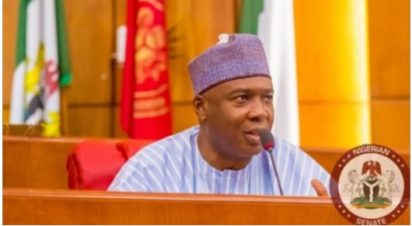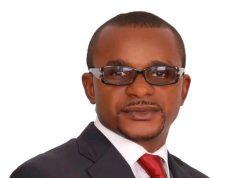SO if you have continuing rise in debt, the interest payment will rise, and then, it will consume a large part of any revenue that you collect and you won’t be able to use that revenue for objectives of economic growth and recovery programme, and increasing growth and employment— International Monetary Fund, IMF.

WHAT the IMF has just stated could have been written by a second year student of Economics in any good university in the world. But, curiously, it is a lesson which has not found its way to Abuja, the Federal Executive Council weekly meetings and to Aso Rock. At the moment there is an urgent request from President Buhari in the Senate for the approval of a $5 billion loan package.
Depending on which exchange rate one adopts, from N315 to N360 per US dollar, the request runs from N1.575 trillion to N1.8 trillion. Given the 2017 budget of N7.2 trillion, the additional loan alone constitutes between 22 and 25 per cent of the year’s budget.
Currently, the nation is sitting on N19 trillion cumulative debts which represent two and a half times this year’s budget and on which close to 28 per cent of this year’s revenue will be spent.
In fact debt repayment is the largest single item on our recurrent expenditure. Nigerians are virtually working to keep lenders happy while funds “for the objectives of economic growth and recovery programme” are lacking.
Earlier this year, the Buhari administration launched the Economic Recovery and Growth Programme, ERGP, designed to fast track economic growth. As we approach the end of the tenth month of this year, the ERGP remains a statement of good intentions with no cash backing. Growth is stifled because, frankly speaking, the Federal Government is broke.
Statement of good intentions
The FG has virtually run out of money to fund major projects; to halt deterioration of infrastructure and to close the widening infrastructure gap. Obviously, the need for funds has never been more urgent despite the dangers ahead to which the IMF is pointing our attention. Under the circumstances the obvious question is: what should be the Senate’s response to the request?
That loan request must be approved is inevitable; otherwise government will crawl to a dead stop. But, while loan approval is unavoidable, the amount approved and the projects to be financed with the debt and the plans for repayment need to be negotiated properly. A blank cheque authorizing expenditure of $5 billion as the FG wishes will not do. Already, with less than 20 per cent of this year’s capital expenditure to be released by December 31, most projects on the budget will not be funded this year. Even the extension of the 2017 budget to next year will not save all the projects in the budget. Some will still be axed. Equity demands that all the zones of Nigeria are equally treated in this regard. It will certainly be unacceptable if some zones get all their funding while others suffer disproportionately.
The appropriate approach to solving this problem is for the Senate to insist that the FG should prioritise those projects which when funded from loans will be self-liquidating. In other words, fund from loans only those projects that will repay the loans – not populist give-away programmes that will only drain more of the meager financial resources available to government.
Second, the Senate should ensure that the projects cover all the six zones of Nigeria without favour to one region since all Nigerians will repay the loan directly or indirectly.
Third, they should obtain an undertaking from the FG that there will be no alteration to the list of projects to be funded without recourse to the NASS; and there should be no virement under any circumstances after the approval.
Then the Senate should quickly grant the request for the most obvious reason. Although, by granting the request the Senate would have raised Nigeria’s debt ceiling without a public hearing regarding its short and long term implications. Withholding consent will bring the government to a halt before the end of the year. And no nation can afford having a government shut down on account of funds to operate.
The FG and its Economic Management Team had committed a blunder by not foreseeing early enough the fact that aggregate revenue from all sources was lagging far behind budget right from January and continued every month except July. By August, it was clear to financial analysts that Nigeria was heading for trouble as the nation’s “Cash Cow”, the Nigerian National Petroleum Corporation, NNPC, racked up operational losses virtually every month.
The IMF and World Bank had separately pointed out this fact which our leaders wanted to hide from us. They can hide no more. We desperately need the loan.




